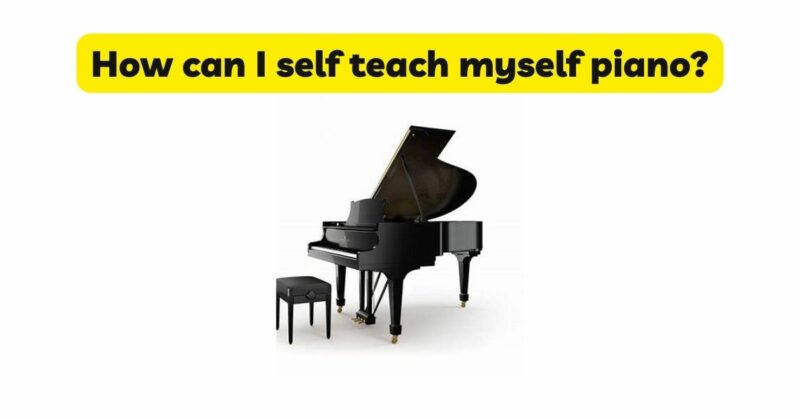Learning to play the piano is a fulfilling and enriching endeavor that opens doors to self-expression and musical exploration. While formal lessons with a qualified instructor are highly recommended, self-teaching can be a viable and rewarding approach for those who are motivated and committed to their musical journey. In this article, we will provide a comprehensive guide on how to self-teach yourself piano, covering essential aspects such as setting goals, establishing a learning routine, developing technique and theory, building a repertoire, utilizing resources, and seeking feedback. By following these steps, you can embark on a successful self-guided piano learning adventure.
- Set Clear Goals: Begin your self-teaching journey by setting clear and realistic goals. Determine what you want to achieve with your piano playing, whether it’s learning to play specific songs, improving your technique, mastering music theory, or becoming proficient in a particular style. Break down your long-term goals into smaller, manageable milestones to keep yourself motivated and track your progress along the way.
- Establish a Learning Routine: Consistency is key when self-teaching piano. Establish a regular practice routine that fits your schedule and commitments. Dedicate specific time slots each day or week for focused practice sessions. Treat these practice sessions as important appointments with yourself, honoring the commitment to your musical growth. Aim for regular, shorter practice sessions rather than infrequent, lengthy ones to maintain momentum and progress steadily.
- Start with Fundamentals: Begin your self-teaching journey by building a strong foundation in piano fundamentals. Focus on proper hand position, posture, and finger placement. Learn to read sheet music and understand basic music theory concepts such as rhythm, notation, scales, and chords. Familiarize yourself with the keyboard layout and note names. Online resources, books, and instructional videos can provide valuable guidance in mastering these fundamental skills.
- Develop Technique and Dexterity: Developing good technique and finger dexterity is crucial for effective piano playing. Practice finger exercises, scales, and arpeggios to improve finger strength, coordination, and agility. Pay attention to proper hand and finger placement, aiming for relaxed and fluid movements. Focus on playing with clarity and precision, gradually increasing speed and accuracy. Regular technical exercises will lay the groundwork for more advanced piano repertoire.
- Study Music Theory: Understanding music theory enhances your ability to interpret and create music. Self-teaching allows you to explore music theory concepts at your own pace. Dive into topics such as intervals, key signatures, chord progressions, and harmony. Online resources, books, and instructional videos provide comprehensive lessons and exercises to deepen your understanding of music theory. Applying theory to your practice sessions will enable you to analyze music, improvise, and compose with confidence.
- Build a Repertoire: Building a repertoire is an essential part of piano playing. Select pieces that match your skill level and musical preferences. Begin with simpler pieces and gradually progress to more challenging ones. Focus on mastering one piece at a time, paying attention to technique, dynamics, and musical interpretation. Utilize sheet music, online resources, and instructional videos to guide your learning process. Building a diverse repertoire will provide opportunities for self-expression and showcase your progress.
- Utilize Online Resources: The internet offers a vast array of resources for self-teaching piano. Online tutorials, video lessons, and interactive platforms provide valuable guidance and instruction. Websites such as YouTube, music learning platforms, and forums host a wealth of instructional videos, sheet music, and virtual communities. Explore different resources to find those that resonate with your learning style and goals. Online platforms also offer the advantage of flexibility, allowing you to learn at your own pace and revisit lessons as needed.
- Seek Feedback and Evaluation: While self-teaching implies independent learning, seeking feedback and evaluation is crucial for your progress. Record yourself playing and listen critically to identify areas for improvement. Share your recordings with trusted friends, family members, or online piano communities for constructive feedback. Consider attending piano workshops, masterclasses, or local piano groups to receive valuable insights and guidance from experienced pianists. Seeking occasional guidance from a qualified piano teacher can also provide expert feedback to refine your technique and musicianship.
- Embrace Performance Opportunities: Performance is an integral part of the piano learning experience. Seek opportunities to perform for friends, family, or small gatherings. Sharing your music with others builds confidence, strengthens your playing, and offers valuable performance practice. Consider participating in recitals, open mic nights, or local music festivals. Embrace these opportunities to showcase your progress and connect with fellow musicians and enthusiasts.
- Maintain Passion and Persistence: Self-teaching piano requires passion, persistence, and self-motivation. Embrace the journey as a lifelong pursuit of musical growth. Stay motivated by exploring different musical genres, listening to inspiring performances, and seeking out new challenges. Celebrate your achievements along the way and remember that progress may come in waves. Embrace the joy of the process and cultivate a love for music that fuels your commitment to self-teaching.
Conclusion: Self-teaching piano is an exciting and rewarding path to musical proficiency. By setting clear goals, establishing a learning routine, focusing on fundamentals, developing technique and theory, building a repertoire, utilizing online resources, seeking feedback, embracing performance opportunities, and maintaining passion and persistence, you can embark on a successful self-guided piano learning journey. Remember that while self-teaching offers flexibility, seeking occasional guidance from a qualified piano teacher can provide valuable insights and help refine your skills. Enjoy the process, embrace the challenges, and let your love for music guide you as you unlock your melodic potential.


